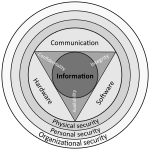Cataclysm resulting from a large-scale sabotage of all computerized networks
Cybergeddon (from tech. cyber-, lit. "computer"; Hebrew: Megiddo, extracted from Har Megiddo ("mountain of final battle")) refers to cataclysm resulting from a large-scale sabotage of all computerized networks, systems and activities. It combines cyberterrorism, cyberwarfare, cybercrime, and hacktivism into scenarios of wide-scale internet disruption or economic collapse.[1] Economic or industrial infrastructure could be targeted, such as banks[2] or industrial control systems.[3] Since 2012, the number of Internet-based attacks and their complexity has increased.[4]
"Cybergeddon is a possibility," FireEye CEO Ashar Aziz explained in an interview with Bloomberg: "Attacks on critical infrastructures such as the power grid or financial institutions could wreak havoc not just on United States economy, but in fact, the world economy."[5]
The Defense Technical Information Center cited nuclear electromagnetic pulse attacks as a part of the military action that may bring about cybergeddon.[6]
